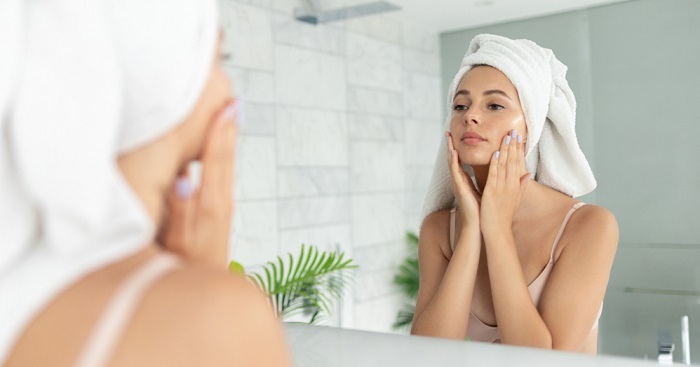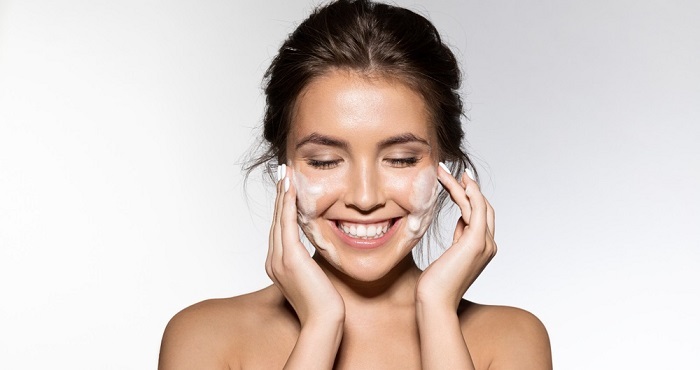

It is important for people with different skin types to follow diverse skin care routines. People with oily skin do routine treatment to keep their skin dry whereas people with dry skin use moisturising creams. What one may follow can be harmful or ineffective for others. Hence, it is necessary for people with different skin types to follow different skincare routines.

These are −
Begin your skincare routine by washing your face with a gentle cleanser. Wet your face with lukewarm water, then apply the cleanser in circular motions for 30 seconds. Thoroughly rinse and pat dry with a soft towel.
you can apply a toner to your face using a cotton pad or your fingertips. This will help remove any remaining dirt and oil while restoring the pH balance of your skin.
After that, apply a serum to your face. Serums are potent formulations that deliver active ingredients to the skin. Select a serum that addresses your specific skin issues, such as hydration, brightness, or anti-aging.
Once a week, you can also add some extra pampering to your routine with a hydrating mask or gentle exfoliating treatment. Hydrating masks can help boost moisture levels, while gentle exfoliating treatments can help remove dead skin cells and allow your moisturizer to penetrate more deeply.
You don't have to go all out with your skincare routine if you have normal skin.
You should, however, make it a point to stay healthy, hydrated, and adhere to a basic skincare regimen. Here are some skin care routines for normal skin −
Apply an eye cream to the area around your eyes. Because this area is delicate and prone to dryness and fine lines, it is critical to use a product designed specifically for it.
Apply a moisturizer to your face and neck. Normal skin does not require heavy hydration, so look for a lightweight, non-greasy moisturizer.
Use a broad-spectrum sunscreen with an SPF of at least 30 to complete your skincare routine. Before going outside, apply it to your face and any other exposed skin.
You can add some extra pampering to your routine once a week by using a mask or exfoliating treatment. This will help to remove dead skin cells and impurities from your skin, leaving it refreshed and glowing.
Makeup has the potential to clog pores and cause breakouts. You want to avoid this by taking it off at the end of the day. Even if you don't wear makeup, wash your face before going to bed. Outside dirt and bacteria can clog pores.
Oily skin is caused primarily by excessive sebum production. This skin type has excessive oil secretion, is shiny, sweaty, and more prone to acne, blackheads, and other skin problems. The following are the skin care routine for oily skin type.
Apply an oil-free moisturizer to your face and neck Regularly. Look for a lightweight, non-greasy formula that won't add excess oil to your skin. Moisturizing on a regular basis will keep your skin hydrated and prevent it from producing too much sebum. It is critical to select the proper moisturizer. For oily skin, a lotion-based, lightweight moisturizer is recommended.
Keep your skin moist by drinking plenty of water. This will keep your skin from producing too much oil.
Wash your face twice a day to get rid of dirt and bacteria that could clog your pores. Avoid over-washing. Over washing can strip your skin of essential oils. This can cause sensitive skin and make it oilier.
Use chemical-laden, thick skincare products and ingredients as little as possible. Instead, look for non-comedogenic makeup that won't clog your pores. Use gentle cleansers and avoid scrubbing.
A lack of moisture in the skin can cause it to appear flaky and rough. This is referred to as dry skin. Dry skin produces less oil and appears lifeless. This skin type is prone to dryness and is vulnerable to weather changes. Here are some skin care routines for dry skin −
Moisturize your skin after bathing on a regular basis to keep it soft and hydrated.
Limit the amount of time you spend in the shower. Shower for a shorter period of time, no more than twice per day.
Gently pat your skin while drying yourself. While bathing or drying, avoid scrubbing.
Stay hydrated by drinking plenty of water.
Use a humidifier to help your skin retain its natural moisture.
Apply sunscreen to your skin to keep it hydrated.
Use gloves when using household detergents, cleaning agents, and so on.
Combination skin is a cross between dry and oily skin types. This skin type requires adequate sun protection because it is oilier than other types of skin and more susceptible to sun damage. The following are some skin care routines for people with combination skin.
If you have combination skin, your T-zone pores are larger than the rest of your face. Harsh products have the potential to clog your pores. It is advised to use a gentle cleanser.
Exfoliating on a daily basis is not recommended for any skin type: It has the ability to remove necessary oils from your skin. Don't scrub your T-zone too hard when exfoliating. Scrubbing too hard can cause skin damage.
Sunscreen is an essential skin care product. If you have combination skin, look for an oil-free sunscreen.

It is skin that is easily irritated and more reactive than normal skin. This type of skin is fragile, prone to heat, redness, itching, and other symptoms, and it loses its barrier, allowing microorganisms and irritants to enter and causing infections and allergic reactions. The following are some skin care routines for sensitive skin.
A patch test is required if you do not want your skin to react. Use a product only after testing it on your hand. After the patch test, wait 24 hours. Apply it to your face if your skin does not react to it.
Purchase a gentle cleanser, moisturizer, and sunscreen. Avoid using too many products on your face. Begin with a gentle, sulfate-free cleanser that does not lather on your skin. Choose products formulated with soothing ingredients such as green tea extracts, chamomile, and so on.
Products labelled "hypoallergenic" may not be suitable for you. Before using these products, perform a patch test.
Long, hot showers can make you feel good, but they can also make your sensitive skin red and irritated by removing essential oils. To avoid irritation, avoid taking hot showers.
A skincare routine is important for all skin types, as it helps to keep your skin healthy, clear, and glowing. However, it's important to tailor your routine to your specific skin type to ensure that you're using the right products for your needs.
Remember to always patch test new products before incorporating them into your routine and to consult a dermatologist if you have any skin concerns. By following a tailored skincare routine, you can help keep your skin healthy and radiant.